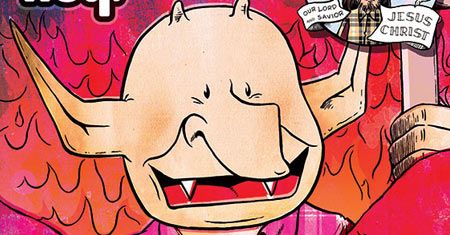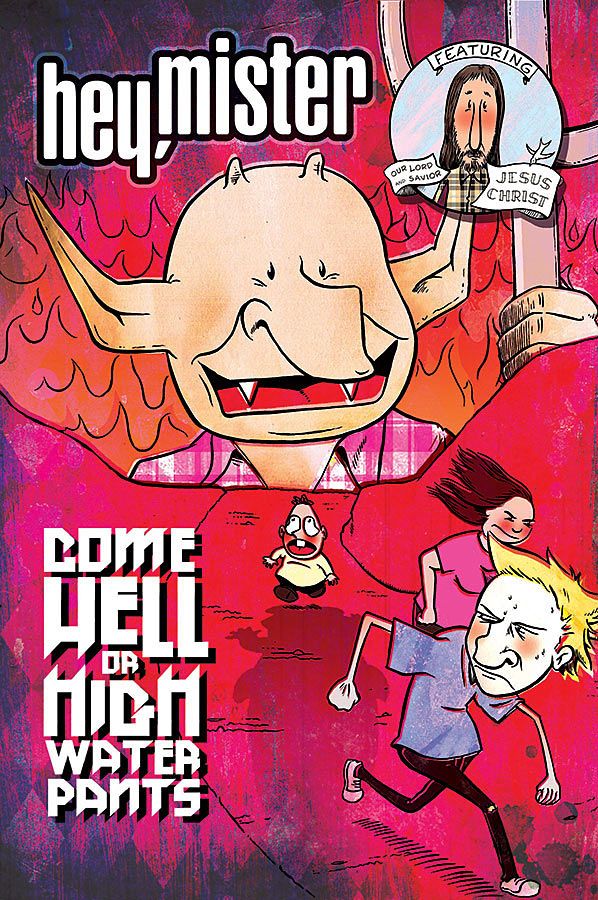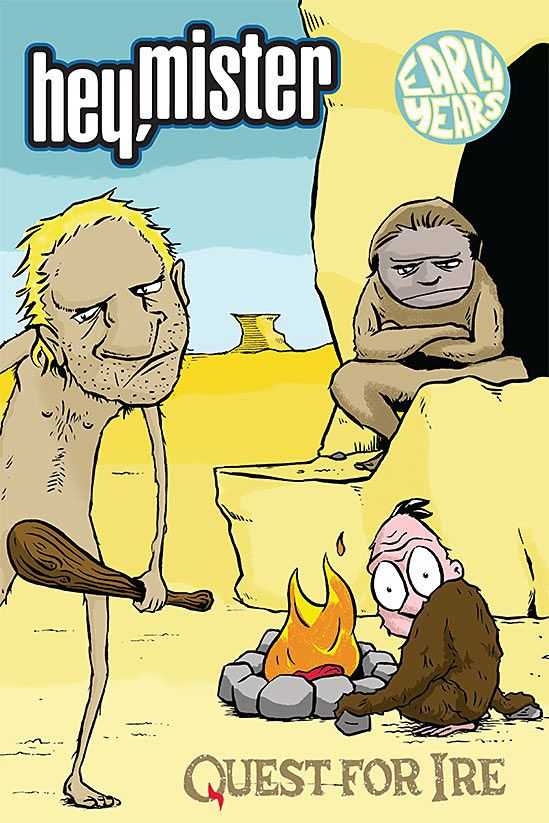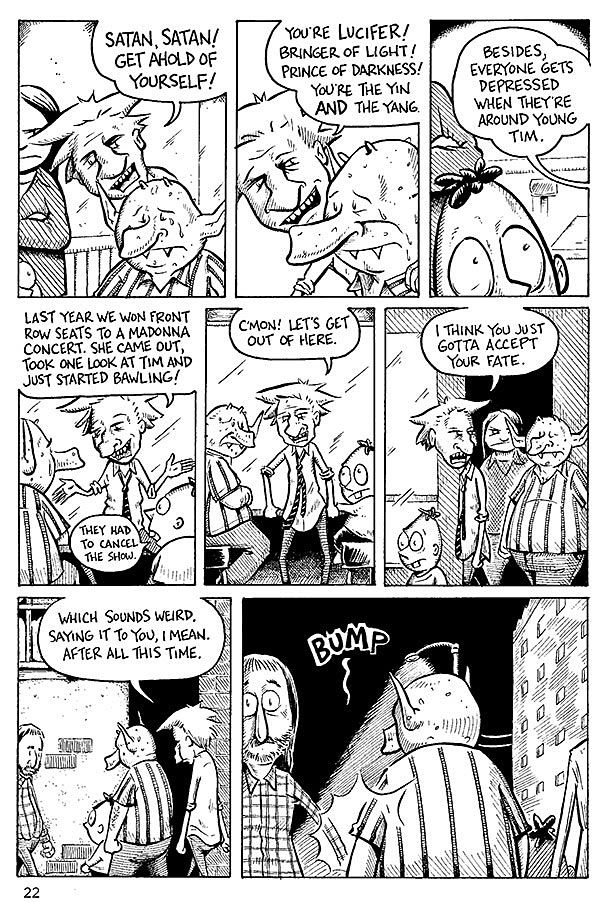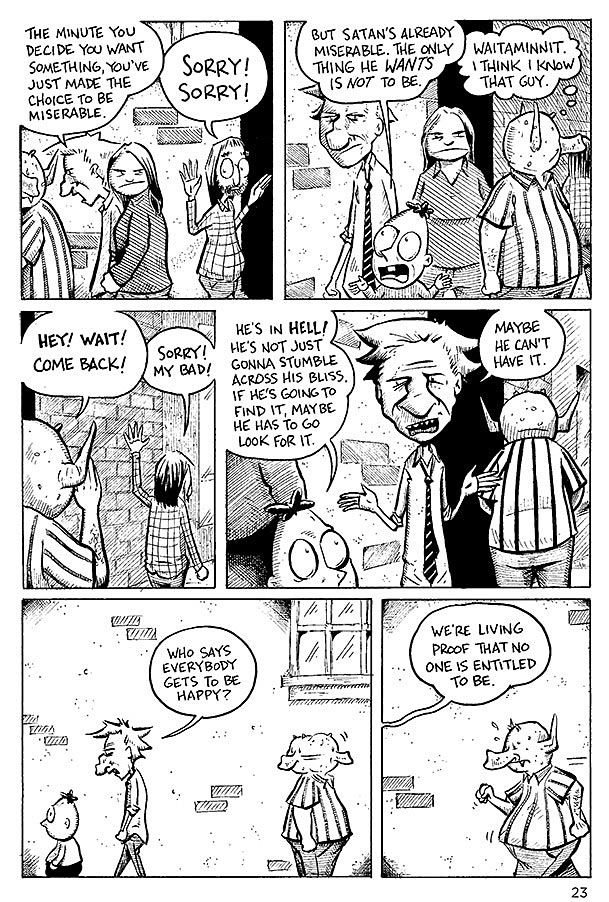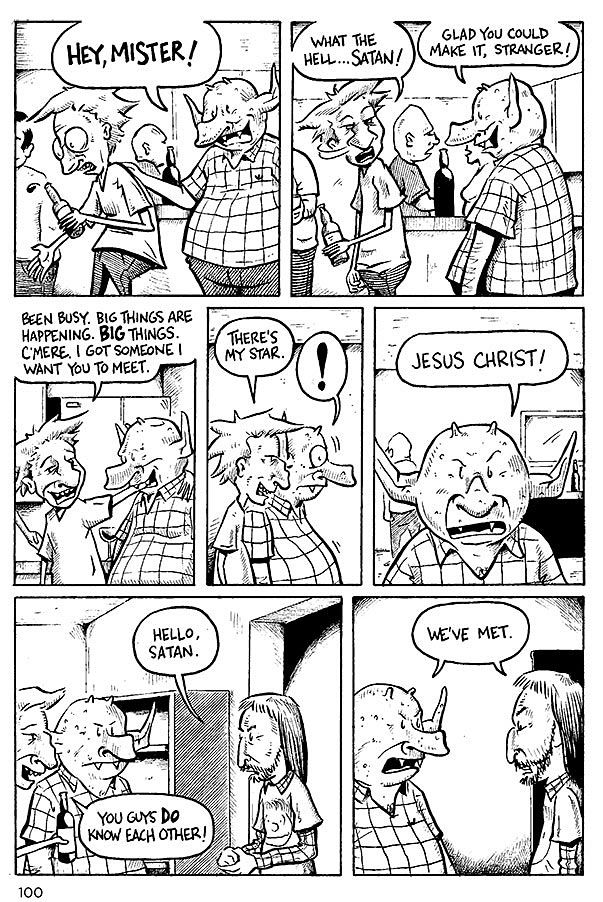For many years, Pete Sickman-Garner was a major figure in alternative comics. He was one of the funniest cartoonists around, and the first signed to Top Shelf Productions. Sickman-Garner is best known for "Hey, Mister!," a humor series that involves the strange, surreal and hilarious misadventures of Mister, Young Tim and Aunt Mary. His work has been collected in three volumes, "After School Special," "Celebrity Roast" and "The Fall Collection."
For the first time in more than a decade, Sickman-Garner has returned to comics with his first full-length graphic novel, "Hey, Mister: Come Hell or Highwater Pants." A story of Satan wanting to leave hell, Jesus coming to terms with the changing times, and a new series of schemes by the titular Mister complete with cameos by Teddy Roosevelt and Top Shelf's Chris Staros & Brett Warnock, it shows that Sickman-Garner hasn't lost anything after years of writer's block. CBR News spoke with Sickman-Garner about the new book, what put him back in the saddle and what might be coming from him next.
CBR News: As a first question, for people who don't know or who have forgotten, what is "Hey, Mister?"
Pete Sickman-Garner: "Hey, Mister" started as an excuse for me to make fun of college students. It started as a strip in a college newspaper, "The Daily Cardinal" in Wisconsin. I wasn't a student at the time. I worked in a bookstore. I was twenty-four, I think. I wanted to invent characters who could be mouthpieces for whatever rant I felt like going on that day. After the daily strip ended I started doing mini-comics and longer stories and at that point the characters took on actual personalities. Over the twenty years I've been doing this, the characters needed to grow into something that stayed interesting. And when I sat down fourteen years ago to write my new book I realized I had run out of ideas for these characters.
The three characters are a guy that looks like a little boy, but probably isn't, named Young Tim. A guy named Mister, and the germ of Mister came from "Calvin and Hobbes." Calvin's a little brat. He's really obnoxious. He'd be a horrible child to have to raise. I thought, what if Calvin grew up thinking the world was going to continue to totally indulge him and his fantasies would always become reality? He's going to turn into this guy. Mister's hair is modeled after Calvin's. Mister is Calvin gone to seed. For Aunt Mary, I just wanted to come up with a female character that kicked everybody's ass.I always thought of them as three actors who could realize whatever script I came up with. I wouldn't write a story based on Mister or Tim, I would write a story that I thought was interesting and then cast them. As they started to take on personalities of their own, I felt like I was writing for them and after eight issues of the series, I couldn't get anything new written. It took me fourteen years and two totally new characters.
Were you just trying different ideas and approaches but nothing was coming together?
For years I blamed my lack of productivity on my day job and having kids. But after I finished "Come Hell or Highwater Pants" I went back through my journal and I discovered I did what I always did when Top Shelf put out one of my collections, I started writing a new comic. I used to write four thirty-six page comics and after I made four they would put together a trade paperback. The last trade paperback came out, "The Fall Collection," and I sat down to write my next comic and I have two years worth of journal entries of just hitting a wall. It was not until I introduced the character Satan that the writing started to pick up steam. It took a long time to get back up to speed. It was writers block, but I didn't think of it at the time because you think of writers block as, "I'm tortured and tormented and can't come up with any ideas." But my life was awesome. I was raising kids and working a great job and I love my dogs and my softball team and fantasy baseball.
Comics is probably like marathon running, once you fall out of the habit, it's an easy thing to put aside. I never stopped self-identifying as a comics writer and the longer the time stretched from when I put something out, the more desperate I started to feel. I can't keep calling myself a comics artist if it's been four-six-eight-ten years since I wrote something. About five years ago I felt, I have to push and get this done or say, I'm done with that part of my life. That felt like an abyss, to say I'm done with this, so I pushed and got it done.
When you talked about thinking of them as actors that really spoke to me with this book, more than the others in a way. Or maybe it just stands out more in a full-length graphic novel than a short story.
I don't know. I don't talk to a lot of other comic writers so I don't know how people do it but I've always thought of my approach as similar to how they do Spinal Tap or a lot of those ensemble comedies. The scripts I write are very loose. I do a lot of scriptwriting but then when I'm pencilling and I go to put in the dialogue I wrote and I come up with something funnier so I revise it. I start inking and I think, this joke would be a whole lot better if... So, there's a lot of improvisation that happens as I'm drawing it out. Maybe I have a sadistic streak, but the idea that they are actors implies that I am their director and it's this little fictional world where I can be God and do whatever I want to them. The character that I play in "Hey, Mister" is this clueless idiot who has all control. I am George Bush. [Laughs] To be able to satirize the kind of person that has always vexed every right-thinking person on the planet, the guy who shouldn't have control but does, to be able to make fun of him embodied by me is one of the most enjoyable parts of writing "Hey, Mister."
This one even more than others felt like Mister and Mary and Tim going about their lives and then caught up in bigger plot involving others.
I think that has everything to do with the fact that the stories I was trying and failing to write were all about advancing their characters. What's Mister going to do next? What's next in Tim's life? I don't know. Maybe I was getting older and thinking about what's next for me, but I couldn't figure out what they wanted to do next and I got stuck. I did have this other idea -- which was actually born out of one of the daily strips from "The Cardinal" in Wisconsin twenty whatever years ago. I had this idea of Satan coming to live with them. When he became the center of the story, they got taken for a ride, and it made it all that much easier. I could use the characters I'd already developed -- Tim, the kid in need of a father figure, Mister, the huckster always looking for the next deal, and Mary, just wanting everybody to get the fuck out of her life and leave her be -- they fit much better as supporting actors than lead actors. I think I have exhausted the lead roles that I want for them.
You've made comics and mini-comics and daily comics. Was it different thinking in terms of a single longform story?
It was very different and I learned so much. It did slow me down. I had a lot of self-education in just trying to figure out how to structure something that went on over 180 pages. If I was a better learner I would have gotten a book out of the library about screenwriting or gone and audited a class. But I didn't so I learned really basic things like you have this narrative arc that builds to a climax. I kept writing Satan's story and I kept getting stymied because I like the conceit that Satan wants to leave Hell and stop being there, but then what? In order for him to have a climax (ew!) he needs to have an adversary. The thing took off when I came up with the thread for Jesus. Then I realized if Jesus is going to be Satan's adversary then he needs his own story, too. That meant going back to Chapter One and writing in his story as well. All of those things went very slowly. I wrote five chapters just about Satan and then realized he needs Jesus so let's go back to chapter one and rewrite the whole thing. Once I had the foundation of the whole narrative in place and their basic stories sketched out it was just a matter of pacing and writing funny dialogue. I feel like I'm a person who learns by doing and I think now I have a solid feel for how to put together a long story. You don't want to make it too mechanical, but I'm not doing experimental fiction, so there are rules I have to follow and I had to figure out what all those were.
Does a lot of the work come in the writing stage before you start putting it down on paper?
I have a sketchbook and it's mostly tons and tons of writing. If I'm putting together a scene, I know it starts in a certain location and then these five things have to happen in it. I'll write five or six different versions of it and keep writing and keep writing. In this book I don't have any stage directions at the top of a single panel to indicate action so all the motion has to be clear from the pictures. There is almost no "meanwhile, across town" kind of direction for the reader. I would say I probably spend sixty-seventy percent of the time writing and then twenty percent doing the pencils and twenty percent doing the inks. This book took fourteen years and I started inking in January 2012 and I finished in February 2013 so one full year was inking and I will never leave a one hundred-eighty page book to be inked all at once again. I drew the whole thing and I forgot -- because it's been so long -- to use blue pencil so a huge chunk of the inking was erasing. [Laughs] I take that as something I deserved that because I shouldn't have slacked for so many years. [Laughs]
Was there any point over those fourteen years where you thought, why tell a huge story at all and just make a bunch of short stories?
I started this book trying to write short stories like I'd always done, and I had three or four that never amounted to a "Hey, Mister," but after I stalled for a few years I never thought of putting out a single issue again. I think probably maybe that had something to do with as the years accumulated I felt like I can't just come back with a 32-page book. Nobody wants to have to make a comeback. Nobody wants to put themselves in that position -- but I did. So, I wanted to comeback with something bigger. There was also a sense of, I never got those shorter books done. I couldn't get the ideas so why go back to something that didn't work? The idea I was chewing on was a lot bigger. I think I was set on doing something longer from the moment I realized I had a good idea.
Where did Teddy Roosevelt come from?
[Laughs] I don't know. To have the God character is a risky venture in anything you write. To take on these weighty themes of Jesus and salvation, I knew I was taking a risk. I felt that God has to be aloof and a loner. He doesn't have a coterie of friends. He's God. But he needs somebody to talk to, just as a narrative device to develop his story. When my daughters were little, bedtime would often be making up stories. My wife and I would sit in their room and spin whatever yarn we could come up with and I think we took it as a challenge because some nights it was like, can I just read "Goodnight Moon?" I invented a series of stories starring God and his magic friend Kevin. That stuck with me. He humanizes God enough to be an interesting character but he's magic so he can hang with God. As I was writing this, I got the idea that that's how I can work God into this narrative. In the first draft he started as a black cat and my wife Carol said, "black cat? Can you be more interesting than that? That seems so obvious as an avatar. Maybe he should be something a little weirder. Something like Teddy Roosevelt?" There's that iconic picture of Teddy Roosevelt smiling where you can't see his eyes because his glasses have a glare on them. I thought it would be really fun to draw him where he doesn't have any expression but that. It's not too many scenes in the book so it won't get super-annoying. God needed somebody to talk to and it turns out, it's Teddy Roosevelt.
The other great depiction I'm curious about is how you drew Chris and Brett of Top Shelf. Chris has the line "I would joyfully kill the series if I could. Negotiating his contract was Mr. Sickman-Garner's lone creative act as an artist."
[Laughs] I just thought it would be funny, especially because way back, I was the first person Top Shelf signed -- foolishly. They were a struggling little publisher and they are two of the nicest people. They told me over these past fourteen years, we'll publish the next thing you write -- and I believed them. If I didn't have that lifeline, if I was working with another publisher saying 'show us what you've got and we'll see,' I don't know if I would have finished this book. You take two of the nicest people who are running a small publisher -- so they are by definition struggling -- and let's turn them into assholes. [Laughs] I drew that Chris character after I saw the movie "Topsy-Turvy" with Jim Broadbent. I just thought Chris is going to be this huckster and let's make Brett the heavy and give him a mullet. I guess I do like to turn people into their exact opposites so that's what I did to Chris and Brett. They never said anything so I guess it's okay. [Laughs]
I'm asking about these characters but the biggest aspect of the book is religion. Christianity and faith have cropped up in your work and I'm just curious what kind of hold it has over you.
If you can explain that to my parents, I'd be grateful. I have no idea. I was raised in a hyper-atheist household where religion was seen as a sign of delusion at best, as a serious psychological problem at worst. Religious people were the capital O other so I went through most of my life -- and it's not like I was snotty about it -- I just didn't know them. I wasn't trying to attack religious people. I married Carol when we were in our early twenties and her mother had been a nun. Carol had gone through Catholic school K-12 so although she was no longer a person of faith, she had a lifetime of really great experiences knowing some really amazing people including many of her mom's sisters who were nuns who led far greater lives than mine; who spent their lives working working in poor places helping people in need. On the one hand I was armed with all of my intellectual arguments about the fallacy of religion, which I still believe. I'm still an atheist. But I was exposed to this world of people who did believe and did good things as a result.
There's that background and then there's America in the '80s and '90s getting intensely more religious in a very cynical and conniving and political way. I was so angry about that and I thought, on the one hand I am learning to be respectful of people who absolutely deserve my respect. On the other hand there are people who are abusing everything about this for their own ends. What do I do? Do I engage with this thoughtfully or do I just try to rip apart the assholes who are abusing this? Or can I do both? [Laughs] There's definitely a push-pull with me about religion. On the one hand I get it now that you can transform your personal being with religious practice. I don't think it necessarily brings you closer to God, because I don't believe there's a God, but I think you can become a different person. It's like any discipline. If you engage with challenging pursuits in a serious, disciplined way you can change who you are and I would say the same about religion so I do get its power. I still am deeply invested in exposing the lies of those who use religion for their own personal gain.
I find Jesus interesting and I find his humanity interesting. I guess my approach to the whole religious question is driven by the fact that I still am after an understanding of why people believe. What about human beings makes them want to think there is a God. I'm pretty sure it's impossible for me ever to believe that. I remember when I was ten years-old and my friend asked me if there was a God and I thought sincerely about it and said 'no, there's not.' Any conception of God that humans can come up with is by its definition inadequate. It's part political, part personal, part why do people think this? I was an English major and the Bible is the foundational text of Western literature and it has good stories so there's a lot good material to mine. I don't know exactly why I care about religion, but I do find it fascinating. It's probably as much a product of this American culture as anything.
It's interesting because you don't mock religion or belief but you do mock aspects of it. On a related note, your bio on the Top Shelf website is obviously over the top and fictional, but it says -- among many other things -- that your parents were missionaries and you were raised in a religious community. In fact you were raised by atheists.
I have another bio on my website which is totally different. [Laughs] I was having this conversation with a person I work with who was talking about her discomfort with her writing group and one of the things I said was, "Just make up a persona. Put on a mask. It's an ancient tradition. Put on a mask and be whoever you want to be." I feel at my most creative when I'm writing those things. I can just make something up about myself and I'll probably always keep doing that. I'm not trying to be deceptive or secretive, it's just so much fun! [Laughs]
Since you finished the book, have you started scribbling anything new?
I got nostalgic -- probably foolishly -- about the idea of a daily strip. I thought I had that in me again, which is crazy, because I don't. I want to put out a weekly strip called "Everyday Jesus." I've already done about twelve and I want to build up a six month reserve before I start releasing them every Sunday on my website at 10 am. So instead of going to church, you can read this. It's the same Jesus character as is in the book but I have discovered that they're only funny if you have knowledge of the Bible. If I say to you "loaves and fishes" and you give me a blank look, you're not going to think this is funny. It's not offensive. I said I was raised by atheist parents but my mother was a closet Lutheran and she's back in the church now. She has an awesome pastor who reads all my comics. I could send these to him. As I'm working on them I'm thinking, I could publish this in "Guidepost." It's pretty clean.
"Hey, Mister: Come Hell or Highwater Pants" goes on sale May 21.

